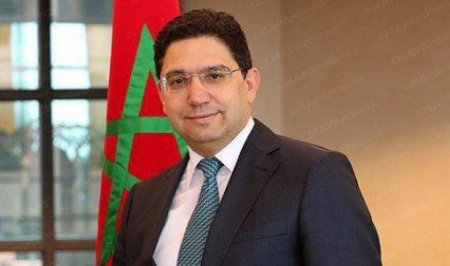Morocco and EU Conclude Revised Agricultural Agreement, Extending Preferential Tariffs to Southern Regions
Morocco-EU: The revised agricultural agreement confirms the application of preferential EU tariffs to the southern regions under the partnership agreement with the Kingdom
Rabat – Minister of Foreign Affairs, African Cooperation and Moroccans Abroad, Nasser Bourita, affirmed Thursday in Rabat that “the Kingdom of Morocco and the European Union have successfully concluded, in a spirit of partnership and consensus, negotiations on amending the agricultural agreement between the two parties”.
Morocco – 3 October 2025 (MT Team) : Bourita explained in a statement that “the signing will take place soon in Brussels”, and that pending the completion of internal procedures, “the agreement will be temporarily implemented once it is signed.”
The minister emphasized that the amended agreement “provides the necessary clarifications, while respecting the Kingdom’s national constants,” and is in line with the spirit and philosophy of the exchange of letters signed between the two parties in 2018. It also remains faithful to its general essence.
In this regard, the minister added that “the agreement confirms the application of preferential tariffs granted by the European Union under the partnership agreement with Morocco in the southern regions of the Kingdom,” stressing that “in general, the conditions for access to the European market applied to products from the north will also apply to products from the Moroccan Sahara.”
Bourita emphasized that the text also includes technical amendments related to informing consumers about the origin of products, as a label indicating the production areas in the south of the Kingdom – “Laayoune-Sakia El Hamra” and “Dakhla-Oued Eddahab” – will be placed on agricultural products.
The Minister also noted that the text recalls the position expressed by the European Union in 2019 on the issue of the Moroccan Sahara, in which it positively noted Morocco’s serious and credible efforts. He added that the text also refers to the subsequent national positions of several EU member states, which expressed their support for the Moroccan autonomy initiative, within the framework of the momentum launched by His Majesty King Mohammed VI.
Mr. Bourita said, “Of course, this is not a political agreement, but rather a sectoral, commercial, and operational agreement. However, it also sends strong and clear signals.”
In this regard, the Minister highlighted the enlightened vision of His Majesty King Mohammed VI, thanks to which “the Moroccan Sahara has become a region of development, connectivity, and prosperity, asserting its position as a hub for regional stability and development.”
Bourita explained that this dynamic explains “the interest of major global and regional powers in economic activities in the Moroccan Sahara, and their desire to encourage trade and investment in the region, making the Sahara a link between Europe and Africa, and between the Mediterranean and the Atlantic Oceans.”
In this regard, the Minister cited, for example, “the strong announcement by the United States last week,” “the Moroccan-French Economic Forum scheduled to be held in Dakhla on October 9,” and “the initiatives that the UK Export Finance Agency intends to undertake.”
Bourita emphasized that the agreement with the European Union “makes a qualitative contribution at the national level” through its contribution to agricultural GDP and the creation and preservation of job opportunities, particularly in the Moroccan Sahara region”.
Naturally, this agreement strengthens the long-standing and solid strategic partnership between Morocco and the European Union,” he said, emphasizing that Morocco is a reliable and credible partner, with whom the EU conducts the largest share of its trade in Africa and the Arab world, amounting to an annual sum exceeding 60 billion euros, including industrial products, equipment, and agricultural products.
He also stressed that “His Majesty the King has always wanted the partnership between Morocco and the European Union to be embodied in concrete joint actions”, highlighting that “the trade and agricultural sectors are certainly important, given their importance in the Kingdom’s economy, but our partnership (with the European Union) also extends to a wide range of political, economic, social, and environmental fields, as well as the sectors of migration and mobility, security, digitalization, and culture.”
The minister said that in a complex regional context where crises have become structural, this steady progress allows Morocco and the European Union to calmly discuss their shared future and formulate an ambitious and promising path.
Bourita concluded, “Today, we are able to harness our existing capabilities, whether it’s preparing for joint events or stimulating the dynamism of our political frameworks, such as the Partnership Council, and laying the foundations for a deeper strategic partnership that will guide our relations in the coming years”.







